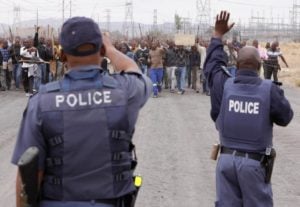 What a bizarre turn of events! The Marikana miners’ case took yet another twist as media reports that all charges against the 270 South African miners arrested for murder following their clash with the South African police two weeks ago were dropped this week.
What a bizarre turn of events! The Marikana miners’ case took yet another twist as media reports that all charges against the 270 South African miners arrested for murder following their clash with the South African police two weeks ago were dropped this week.
Initially, after having 34 of their colleagues killed and many more wounded by the South African police bullets, 270 Marikana miners were arrested and charged with murder under the very same law the apartheid regime used to prosecute anti-apartheid activists. The “Upington 14” case comes to mind here, in which the accused were convicted and sentenced to death in 1989 for the murder of a policeman, only to have the ruling overturned by the appeal court after worldwide public outcry.
The law in question is called the doctrine of common purpose, which gives the state powers to charge anyone, even if they did not kill or throw a stone, who participated in mass crowd action. The ANC—the erstwhile liberation movement then and now the ruling party—vehemently protested against the law, and viewed it as part of the apartheid regime’s strategy to criminalize mass protesting in South Africa (which it was).
The police claim that the killing of the miners was unavoidable because it was an act of self-defense after they were overwhelmed from all directions by petrol bombs and machete wielding, angry miners. A day earlier, after they opened fire, two of their own colleagues were gruesomely killed by the striking miners, so making some people in some quarters of South Africa and around the world think that perhaps the shooting was a case of revenge. Thirty-four dead, a number half the 69 people killed by the apartheid police during the Sharpeville Massacre on 21 March 1960, is too large a number for a self-defense. Could it be that the police overreacted? Nobody seems to know the answer to that question. In an attempt to get some truth, South African president Zuma has set up a commission to investigate the shooting.
But having a legal backing from an apartheid law that is still on the files of South African case laws, the prosecutors who brought the case against the miners initially seemed to believe that they had a strong case against the miners only to back down after public condemnation against the prosecution.
Relying on an apartheid law to charge the striking miners with murder is not only strange for a new South Africa, but a blow to the historical relationship between the South African workers and the ANC Government. Workers Unions, especially miners, have been the backbone of the ANC’s anti-apartheid resistance. After the “Madiba magic” of national truth and reconciliation, who in their right mind thought that an ANC-led Government police would turn their guns on the protestors just like the apartheid security forces did in the 60 and 80s? This indeed a bummer in the post-apartheid South African exceptionalism the world got infatuated with!